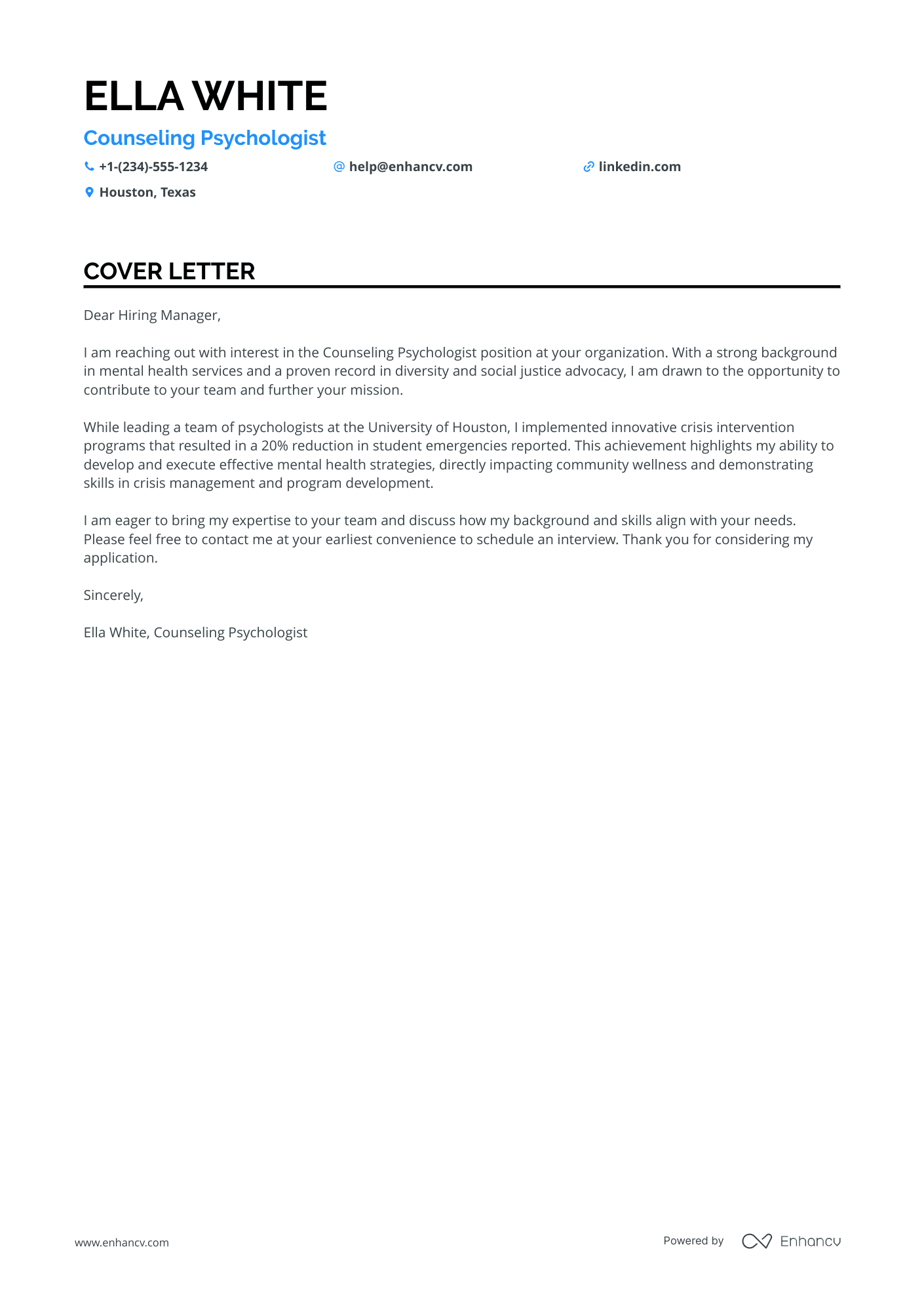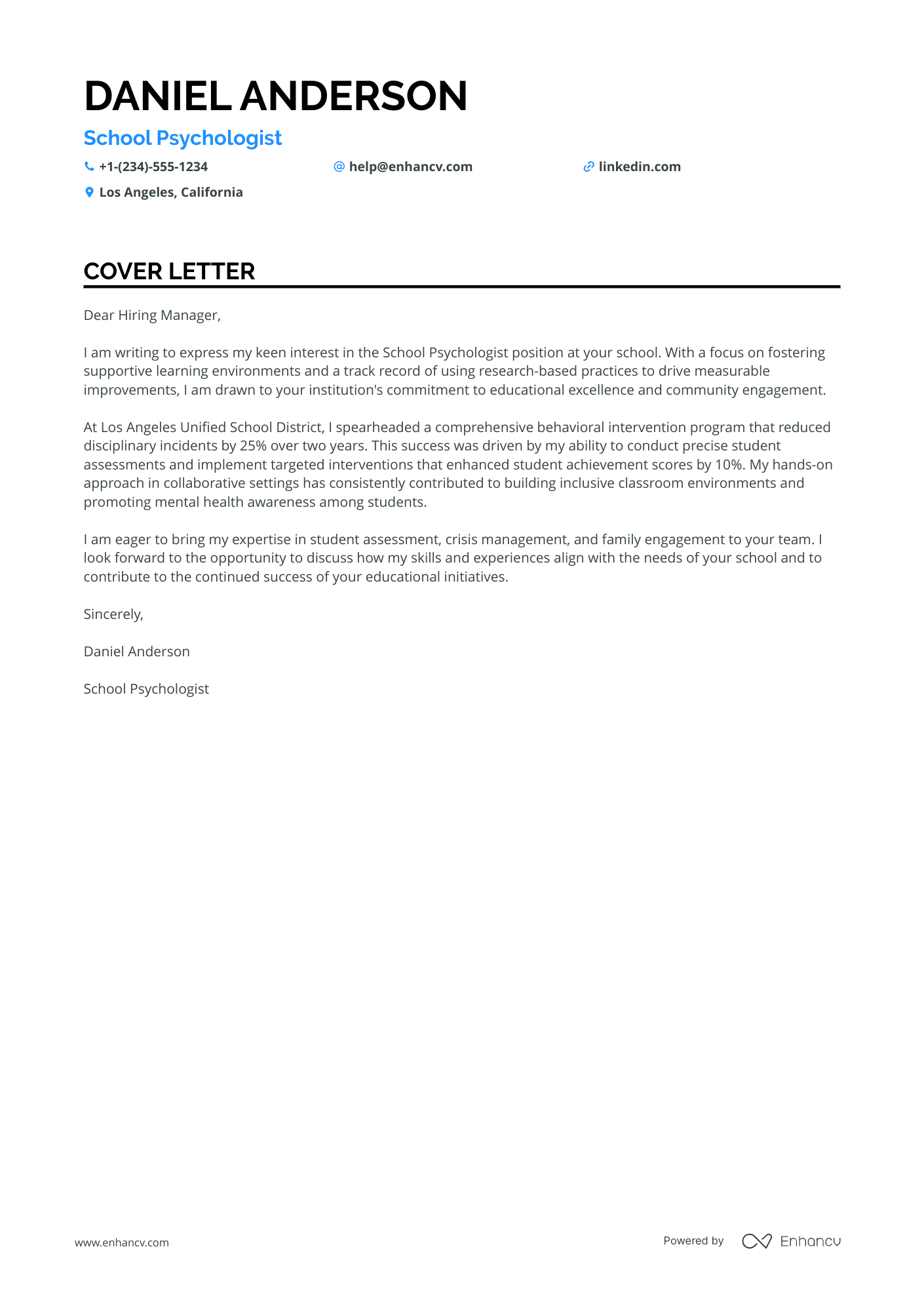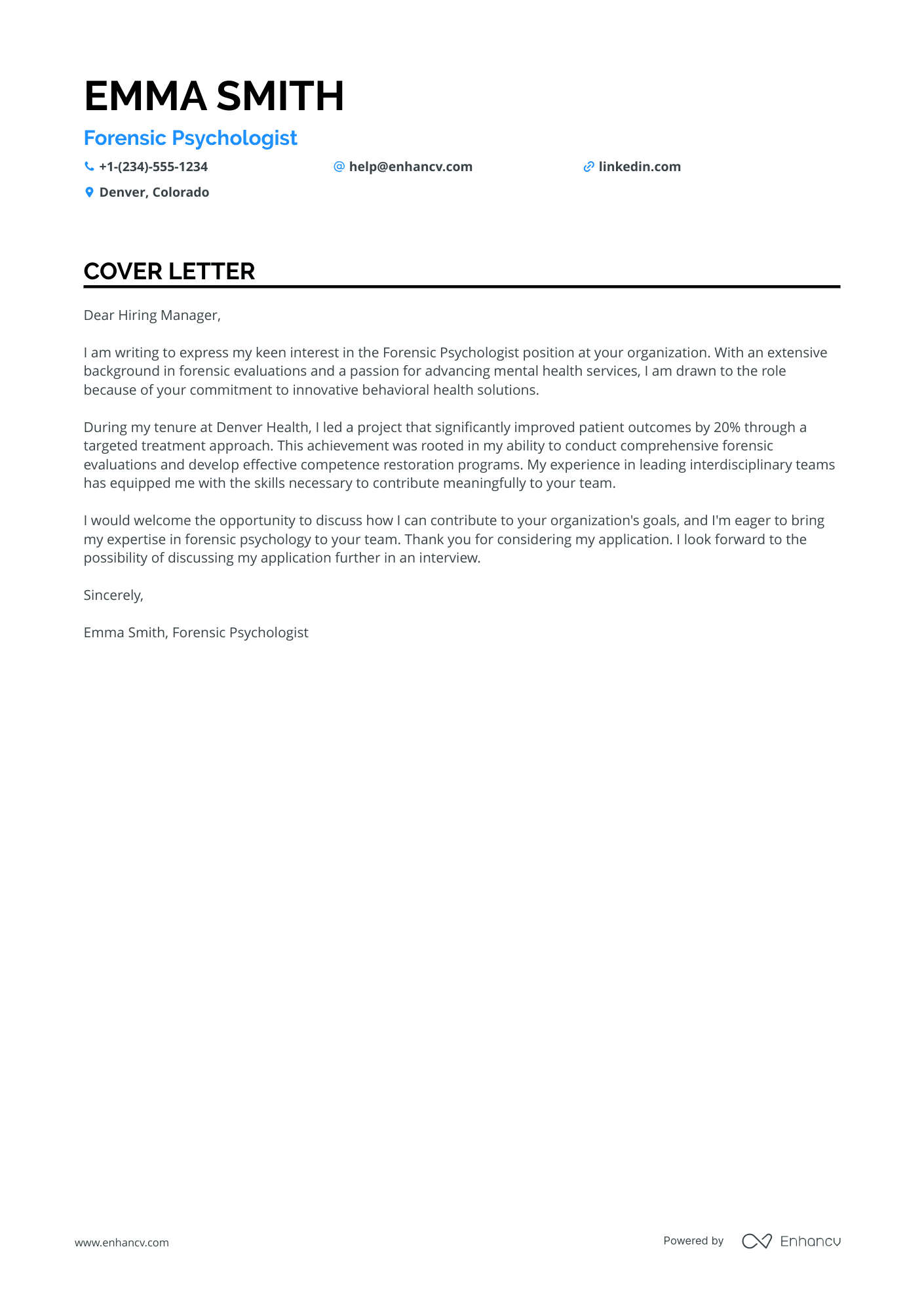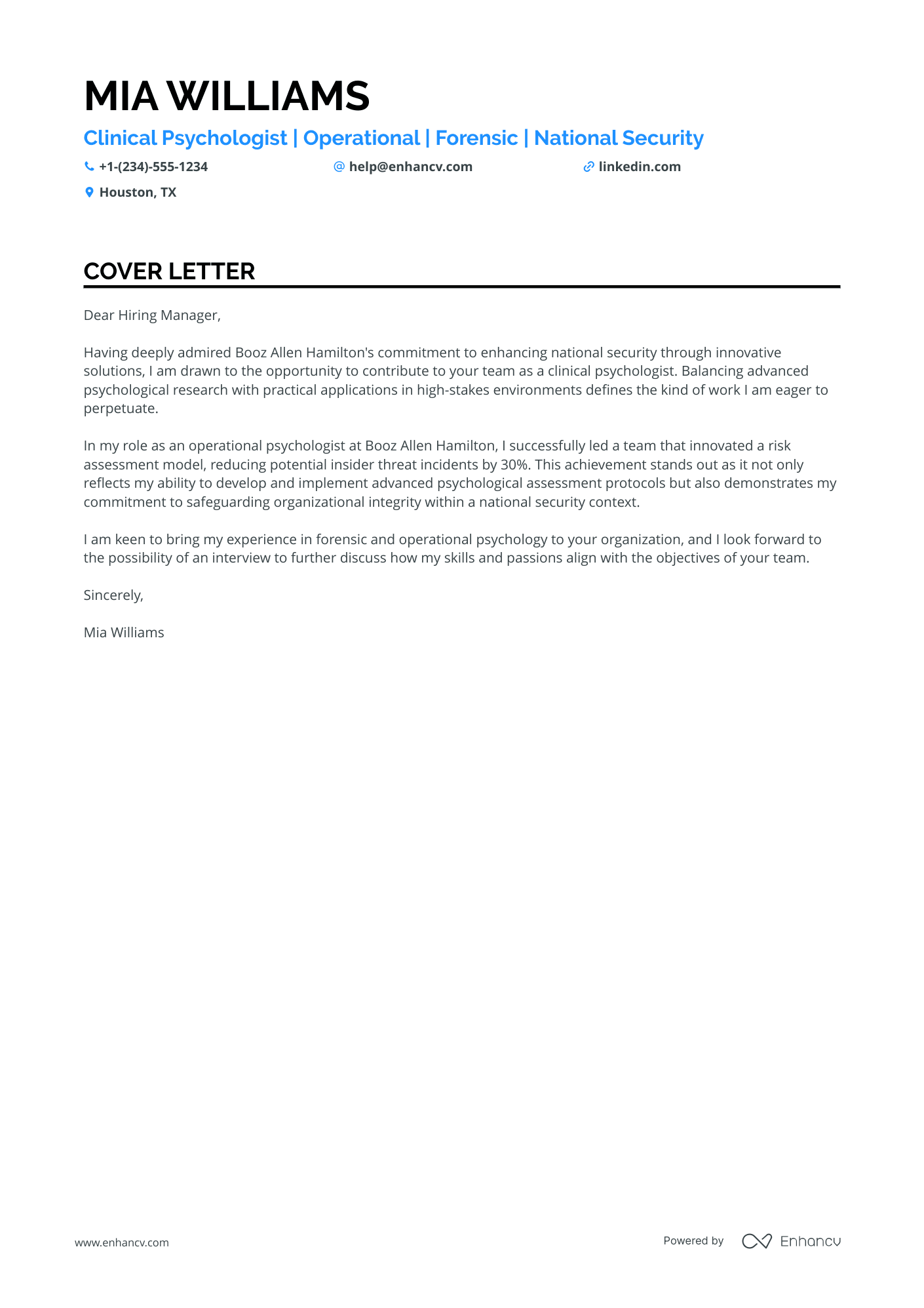As you dive into the job-hunting pool, you've likely noticed that a strong psychologist cover letter can set you apart, but creating one can be daunting. It's not just a repeat of your resume; it's your chance to share a personal success story—one that made you especially proud. Remember to keep it succinct, professional, and original—avoid those overused phrases! Stick to one page and make every word engage your potential employer. Let's tackle this together and make your cover letter shine.
- Personalize your psychologist cover letter and get inspired by other professionals to tell a compelling story;
- Format and design your psychologist cover letter to make an excellent first impression;
- Introduce your best achievement in your psychologist cover letter to recruiters;
- How to make sure recruiters get in touch with you, using your psychologist cover letter greeting and closing paragraphs.
What is more, did you know that Enhancv's AI can write your cover letter for you? Just upload your psychologist resume and get ready to forward your job application in a flash.
If the psychologist isn't exactly the one you're looking for we have a plethora of cover letter examples for jobs like this one:
Drop your resume here or choose a file.
PDF & DOCX only. Max 2MB file size.
Psychologist cover letter example
JOSHUA NELSON
Seattle, Washington
+1-(234)-555-1234
help@enhancv.com
- Demonstration of relevant experience: The cover letter highlights the candidate's successful leadership of a therapy program at Harborview Medical Center, showcasing direct experience in creating and implementing mental health initiatives.
- Alignment of values and goals: There is a clear mention of the applicant's dedication to enhancing therapeutic outcomes and advancing mental health treatments. This mirrors the organization's own commitment to mental health advocacy and patient care.
- Proven results: The candidate cites a quantifiable achievement—a 35% reduction in depression and anxiety symptoms among adolescents—underscoring their capacity to make a measurable impact in their field.
- Professional credentials: The sign-off includes the title "Licensed Clinical Psychologist," confirming the applicant's professional qualification which is essential for the role and reinforces their expertise.
The must-have sections and format of your psychologist cover letter
When writing your psychologist cover letter, keep in mind that it'll only be read by the recruiters and not the Applicant Tracker System (or software used to assess your profile). That's why you should structure your content with a/an:
- Header (apart from your contact information, include your name, the role you're applying for, and the date);
- Personalized salutation;
- Opening paragraph to win the recruiters over;
- Middle paragraph with key details;
- Closing that starts from clichés;
- Sign off (that's not mandatory).
Industry standards dictate your paragraphs to be single-spaced and to wrap your content in a one-inch margin. Designing your psychologist cover letter, refer to one of our templates, which automatically takes care of the spacing and margins.
Choose the same font for your psychologist cover letter as you did for your resume: the likes of Lato and Bitter would help you to stand out in a sea of cover letters in Arial or Times New Roman.
Export your whole psychologist cover letter from our builder in PDF to keep the same formatting and image quality.
Pressed for time? Use our free cover letter generator to turn your resume into a cover letter effortlessly.
The top sections on a psychologist cover letter
- Header: This section should include the psychologist's full name, professional title, contact information, date, and the recipient's details, establishing a formal connection and making it easy for the recruiter to reach out.
- Opening Greeting: A personalized salutation addressing the hiring manager by name shows the psychologist has taken the time to research the organization and demonstrates an attention to detail.
- Introduction: The introductory paragraph should capture the recruiter's attention by succinctly presenting the psychologist's passion for helping others, relevant experience, and understanding of the organization's client population or area of specialization.
- Professional Experience and Approach: This section should highlight the psychologist's most relevant therapeutic techniques, success stories, and how their clinical skills can serve the specific needs of the facility, displaying their fit for the role.
- Closing and Call to Action: A strong closing should reiterate the psychologist's interest in the position and include a proactive call to action, inviting the recruiter to schedule an interview to discuss the candidate's qualifications in more detail.
Key qualities recruiters search for in a candidate’s cover letter
- Empathy and strong interpersonal skills: Empathetic psychologists can build rapport with clients, establishing a foundation for effective therapy.
- Experience with evidence-based therapeutic techniques: Recruiters look for psychologists skilled in proven methods such as cognitive-behavioral therapy or psychodynamic therapy.
- Exceptional communication skills: The ability to clearly convey thoughts and interpret clients' speech and non-verbal cues is critical for diagnosis and treatment.
- Cultural competence: Psychologists must be able to work effectively with diverse populations, understanding various cultural backgrounds and experiences.
- Research experience: Having a track record of conducting or contributing to psychological research can demonstrate an evidence-based approach and a commitment to the field’s advancement.
- Licensure and continuing education: Active licensure shows commitment to professional standards, and ongoing education indicates dedication to staying current in the field.
Kick off your psychologist cover letter: the salutation or greeting
When writing your psychologist cover letter, remember that you're not writing for some complex AI or robot, but for actual human beings.
And recruiters, while on the lookout to understand your experience, would enjoy seeing a cover letter that is tailored to the role and addresses them. Personally.
So, if you haven't done so, invest some time in finding out who's the hiring manager for the role you're applying to. A good place to start would be LinkedIn and the corporate website.
Alternatively, you could also get in touch with the company to find out more information about the role and the name of the recruiter.
If you haven't met the hiring manager, yet, your psychologist cover letter salutation should be on a last-name basis (e.g. "Dear Mr. Donaldson" or "Dear Ms. Estephan").
A good old, "Dear HR Professional" (or something along those lines) could work as your last resort if you're struggling to find out the recruiter's name.
List of salutations you can use
- Dear Hiring Manager,
- Dear Search Committee,
- Dear Dr. [Last Name],
- Dear Professor [Last Name],
- Dear Mr./Ms. [Last Name],
- Attention: [Specific Role Title] Search Committee,
The psychologist cover letter intro: aligning your interest with the company culture
You only have one chance at making a memorable first impression on recruiters with your psychologist cover letter.
Structure your introduction to be precise and to include no more than two sentences.
Here are some ideas on how to write a job-winning psychologist cover letter introduction:
- get creative - show off your personality from the get-go (if this aligns with the company culture);
- focus on your motivation - be specific when you say what gets you excited about this opportunity.
How to select your best achievement for the middle, or the psychologist cover letter body
You probably feel exhausted by this point in your application: you've dived into all the details of your success and skills in your psychologist resume.
What else can you include in your psychologist cover letter body?
Well, for starters, the next three to six paragraphs should show you further value as a professional. Or, why should recruiters choose you?
Think back on a noteworthy achievement that answers key job requirements and dive deep.
Structure your psychologist cover letter middle as you'd a story: following chronological logic and highlighting outcomes, thanks to skills.
At the end of the day, you'd want recruiters to be able to see you as the best candidate for the role and understand more about who you are and what makes your success unique (and valuable to the role).
Thinking about the closing paragraph of your psychologist cover letter
Before your signature, you have extra space to close off your psychologist cover letter.
Use it to either make a promise or look to the future.
Remind recruiters how invaluable of a candidate you are by showing what you plan to achieve in the role.
Also, note your availability for a potential next meeting (in person or over the telephone).
By showing recruiters that you're thinking about the future, you'd come off as both interested in the opportunity and responsible.
Psychologist cover letter advice for candidates with no experience
If you're worried about writing your Psychologist cover letter and have no professional experience, we sure have some advice for you.
Turn recruiters' attention to your transferable or relevant skills gained thanks to your life and work experience.
Instead of writing about past jobs, focus on one achievement (whether from your volunteering experience, education, etc.) and the skills it has helped you build.
Alternatively, you could focus your Psychologist cover letter on your career objectives and goals. Always remember to make those relevant to the job you're applying for by detailing how you see yourself growing as part of the company.
Recruiters would be way more impressed with candidates who fit the job profile and can bring about plenty of skills and vision to the table.
Key takeaways
Creating your psychologist cover letter should be a personalized experience for the role and the recruiter, where you:
- Format your cover letter using the same ATS-friendly font (e.g. Railway) as you did for your resume;
- Greet recruiters, using their name, and follow up with two sentences to introduce yourself, your interest in the role, and to stand out;
- Map out one key success from your career (or life) that has taught you job-crucial skills;
- Substitute your lack of experience with an achievement from your internships, degrees, or volunteering gigs;
- End with a promise for your potential or your availability for an interview.
Psychologist cover letter examples
By Role
Counseling Psychologist
- Highlighting leadership and crisis management skills can demonstrate an applicant's ability to handle high-pressure situations and make a significant impact in mental health services.
- Showcasing measurable achievements, such as a reduction in student emergencies, provides evidence of effectiveness and results-driven approaches in previous roles.
- Mentioning experience with diversity and social justice advocacy aligns with many modern organizational goals, indicating a commitment to inclusive practices and values.
- Expressing enthusiasm for contributing to the organization's mission demonstrates an alignment with its values and goals, making the candidate a potentially strong cultural fit.
School Psychologist
- Highlighting Specific Achievements: The letter mentions a specific reduction in disciplinary incidents and an increase in student achievement scores, showcasing measurable results that indicate effectiveness in the role.
- Emphasizing Relevant Experience: Directly mentions previous responsibility at Los Angeles Unified School District, which provides context and evidences prior successful experience in a similar environment.
- Connecting Skills to Institutional Needs: Makes a clear connection between personal abilities (e.g., student assessment, crisis management) and the school's commitment to educational excellence, demonstrating alignment with the school's goals.
- Expressing Enthusiasm and Fit: Conveys genuine interest in the specific institution by discussing its values and demonstrating how personal goals align with the school’s mission.
Forensic Psychologist
- Highlighting Achievements: The letter effectively showcases improvement in patient outcomes by 20% through a targeted treatment approach, directly relevant to the role.
- Relevant Experience: The letter mentions experience at Denver Health, emphasizing relevant skills like conducting forensic evaluations and leading projects.
- Interdisciplinary Team Leadership: Maintaining an emphasis on leading interdisciplinary teams aligns well with organizational settings where collaboration is typically required.
- Expressing Passion and Fit: The applicant conveys a genuine interest in the organization's commitments, aligning personal goals with the company's objectives and culture.
Clinical Psychologist
- Tailor the letter to align with the company’s mission and values, such as emphasizing Booz Allen Hamilton's commitment to national security and innovative solutions.
- Highlight specific achievements, like developing a risk assessment model that reduced insider threat incidents by 30%, to demonstrate practical impact and success in a similar role.
- Emphasize relevant skills and experiences, such as forensic and operational psychology, that directly relate to the job requirements and responsibilities.













